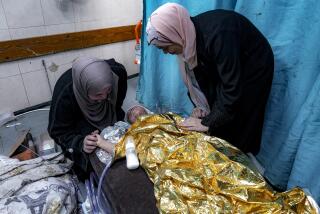An Island of Good Amid the Bad
- Share via
BAGHDAD — Surra and Sumaya are orphans of Saddam Hussein’s brutal and corrupt regime, their parents executed seven years ago for unknown crimes, only to be acquitted by the courts just days after their deaths.
In a small act of recompense, the sisters, ages 10 and 11, shared a bit of the Hussein family booty Tuesday. U.S. civilian and military officials rolled up to the Dar-Al Najat Orphanage and handed out boxfuls of toys that were stockpiled in a lavish game room at one of the Baghdad palaces kept by Saddam Hussein’s son Uday.
The occasion was the birthday of the prophet Muhammad. But the scene was vintage Christmas morning.
Young boys, abandoned by their poverty-stricken families, shrieked as they tore open boxes of Uday’s toy helicopters. The playthings included a cache from UNICEF that the younger Hussein had apparently hijacked for his own use.
Surra, her sister and the other girls spent hours driving two of his dozens of remote-controlled cars around the floor and on one another’s legs. Asked whether she had ever had a toy before, Surra replied: “Once. But it got broken.”
Aneeba Jabar, the orphanage’s director, explained that Muhammad’s birthday is not celebrated in the same way the West marks the birth of Christ. Sweets, not presents, are the traditional handout. But in this tiny refuge that survived the U.S.-led war on Iraq, the massive looting sprees that followed and Baghdad’s continuing insecurity, they were welcome all the same.
Karen Walsh, the top U.S. official on the scene, said Jabar risked her life to protect the orphanage from looting mobs. Jabar said she shamed away the armed thieves by making the children pretend to cry.
“No one has looted any of the four orphanages in Baghdad,” Walsh said. “This is probably the most secure place in the city.”
Walsh and Lt. Col. Jim Otwell, a U.S. military civil affairs officer who helped arrange the day of gift-giving, label the orphanages “the good” in an Iraqi welfare and prison ministry that they liken to the title of a Sergio Leone movie: “The Good, the Bad and the Ugly.”
“ ‘The good’ is the orphanages, ‘the bad’ is the social security system, and ‘the ugly’ is the prisons,” Walsh said.
Walsh, a U.S. Agency for International Development official temporarily serving as the senior advisor to help rebuild Iraq’s Labor and Social Affairs Ministry, said she was shocked to learn that the ministry included the nation’s prisons.
The ministry is supposed to provide a safety net for the elderly, the disabled, widows, single mothers, children with no working parents and others on the margins of society. This social service function of the ministry is “the bad,’ she said, because billions of dinars set aside to care for these people have never been spent.
As for “the ugly,” Lt. Col. Otwell described how the prison system ran on sanctioned bribery.
For every 2,000 dinars (worth about $1 before the war) a family could afford to give a prison official, a relative’s sentence would be reduced by one day. Of that, Otwell and Walsh said, 30% went to the ministry, 30% to high-level prison officials, 20% to the orphanages and 20% to the Iraqi Central Bank. In theory, with enough cash on hand, someone could be sprung from jail in a day.
Otwell said the system was perverted beyond simple bribery.
“If you were sentenced to death, and you paid enough money, the prison officials would get an extremely handicapped or mentally ill person in the social welfare system, and they would substitute him for you,” Otwell said.
Both he and Walsh acknowledged the monumental task they and the Pentagon’s Office of Reconstruction and Humanitarian Assistance face in rebuilding a ministry with 5,000 employees.
Finding those who bear no blame, Walsh said, “is going to be a long process. We don’t have a magic solution, and I don’t think anyone has it for weeding out good from bad. It’s going to be a long, hard road ahead.”
But Walsh said she finds a glimmer of hope in orphanage director Jabar. Just one of those 5,000 employees, Jabar built the facility from the ground up three years ago after a career working in Iraqi child-care facilities. She has run it for the past two years on government funding of about $600 per child per year. She never knew the exact origins of the money, Walsh said.
Today, Jabar has no idea where she will get funding to maintain her orphanage. The reconstruction agency, known as ORHA, which Walsh now serves, handed out emergency stipends to Jabar and her employees last week.
“But I would do this for a year for free, because, for me, this is work for our own humanity,” Jabar said.
More to Read
Sign up for Essential California
The most important California stories and recommendations in your inbox every morning.
You may occasionally receive promotional content from the Los Angeles Times.













